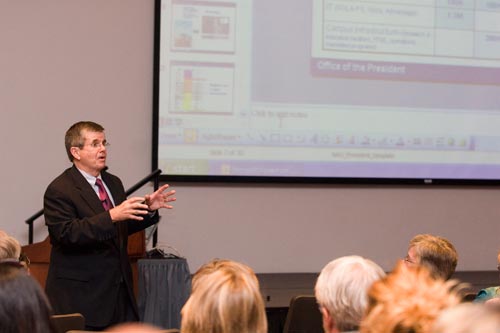
Northern Arizona University has made exciting strides in the past year and has plenty of reason to celebrate.
Growth in every aspect of enrollment, new buildings in Flagstaff and around the state, and new programs and research continue to build upon NAU’s already strong reputation.
At the same time, local and national issues continue to challenge faculty and staff of NAU.
President John Haeger spelled out the successes and challenges on Thursday during a Campus Conversation before about 150 people at Cline Library Auditorium and a statewide web audience. The forum is archived online at www.tv.nau.edu/president.
“We have a lot to celebrate,” Haeger told the audience. “Efforts from virtually every part of campus are partly responsible for increasing enrollment. This did not happen by accident. It happened because of a lot of hard work by a lot of people.”
At the same time, he said, NAU has a number of continuing local issues, including salaries for faculty and staff and deteriorating buildings. NAU also faces national issues such as competitiveness, affordability, accessibility and accountability.
Haeger explained that if NAU is to consider itself an enterprise institution, it will have to foster the culture of a bold, forward-looking university that is responsive and not passive. “We must convince the public and state we are worth the investment,” Haeger said.
Instead of going hat in hand to the Legislature, NAU must perform on a level that demonstrates its significance to students and to society.
“People like to support winners not people who are whining,” Haeger said. “We’re a winner. We need to take it out to the state.”
He pointed out that NAU is an entrepreneurial university more so today than ever in its history. “Four or five years ago we faced enrollment declines and budget shortfalls,” he said. Today, however, enrollment is up and the budget is in good shape. “Any enterprise university is mission driven,” he said. “We are primarily an undergraduate residential institution. Unless we are healthy and thriving, we have difficulty.”
Pointing to a pie chart reflecting NAU’s $310 million budget, Haeger said, “We’ve increased our ability to use reserve funds for our priorities. We had a consultant come in and look at our total budget. He said, ‘You have $310 million here. Spend it on your priorities.'”
Those priorities are faculty and staff salaries, equipment for new buildings and other one-time spending options.
Haeger touched on several other topics during his talk, including faculty and staff commitment to increasing NAU’s retention rate, marketing progress, and the American educational system’s place in a global society.
“The United States is seventh in the world in awarding baccalaureate degrees and falling,” he said. “We’re 17th in teaching science and math and falling.”
NAU’s retention rate is up (nearly 72 percent) but it should be in the 80th percentile, Haeger said, and the university must move resources to make that happen by improving advisement and the first-year experience.
“We must accept a public agenda,” he said. “That means graduating more science and math teachers and health care professionals…. Society and the state will make decisions as to whatever NAU should be invested in.”
Several areas of NAU speak to the public agenda, Haeger said in response to questions. The College of Arts and Letters and NAU Athletics are the two principal outlets to the outside world, he said. “These are pieces of the university the public is familiar with, but there are others, including the conference center and Fossil Creek restoration.”
Another question involved students arriving at NAU unprepared for college-level courses.
“When we say the nation needs to graduate more students, we’re not saying we need to graduate more students who are not competent,” Haeger responded. “We are not reducing our standards, but we will need to shift more money to this area. It’s an institutional and system problem.”
He said that Gov. Janet Napolitano is poised to make dramatic changes within Arizona’s high schools, including increasing the number of math and science teachers.
“Within six months to a year, we should see some changes in K-12 education that will make our job at Northern Arizona University a whole lot easier,” Haeger said.
Blase Scarnati, associate professor in the School of Music and president-elect of the Faculty Senate, told the president that the main priority of the Faculty Senate’s upcoming agenda will be increasing salaries and challenged the president to address how much of the increased tuition dollars will go to faculty compensation.
“It’s all about enrollment,” Haeger replied. “We may get $4.8 million if the state will fund with the traditional 22-to-1 formula and additional tuition dollars. I can commit to faculty salaries, but I can’t give a number.”
Earlier in the presentation, Haeger had pointed out increases in faculty and staff compensation. “We’ve made significant investments in people, including faculty salaries. It’s not where we want to be, but we’ll take steps every year.”



